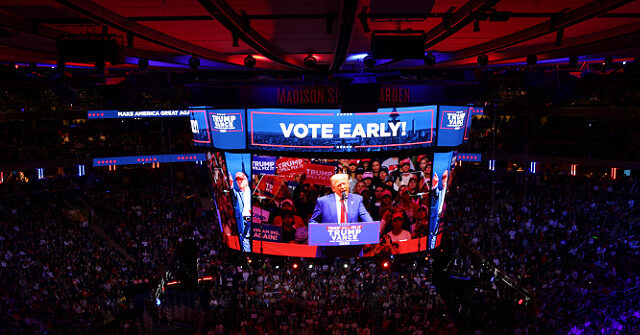MSNBC has sparked controversy for equating former President Donald Trump’s recent rally at Madison Square Garden with a pro-Nazi event held at the same venue in 1939. During a segment, anchor Jonathan Capehart juxtaposed footage from Trump’s gathering with historical clips of the German American Bund rally, where attendees performed anticipatory Nazi salutes. Capehart described Trump’s event as “chilling,” citing the past gathering of over 20,000 supporters of Adolf Hitler as a point of reference. The blending of these two events drew criticism from many Trump supporters, who found the comparison offensive and disrespectful to Holocaust victims.
The backlash emanated from several quarters, particularly among Jewish individuals who felt that MSNBC’s insinuations trivialized the Holocaust. Journalist Yaakov Strasberg expressed outrage on social media, questioning how the rally could be labeled a “Nazi rally” given the support for Trump within the Orthodox Jewish community. Others, like social media influencer Shane Ginsberg, humorously dismissed MSNBC’s assertions, stating their identity as Jewish and openly declaring their support for Trump. Such responses highlighted a significant disconnect between some Jewish voters and the mainstream media’s interpretation of political gatherings.
Proud Republican voices within the Jewish community also chimed in, with individuals like Debra Lea using platforms like X to counter what they perceived as biased narratives from the mainstream media. Her efforts underscored the belief among many that the media’s portrayal failed to represent the diverse political opinions within the Jewish electorate. The contradictions and grievances expressed were particularly poignant in the context of the current political landscape, where accusations and historical comparisons have become routine in partisan debates.
Moreover, Minnesota Governor Tim Walz, campaigning for vice president, mirrored the critical sentiments from MSNBC by likening Trump’s rally to the infamous 1939 event. He urged his followers to look it up, suggesting that he viewed it as more than mere rhetorical flourish. Such comments contributed to the already heated discourse surrounding Trump’s influence and legacy, revealing a broader concern among political figures about the implications of his continued support and the framing of his events.
Responding to these narratives, Breitbart News entered the fray to fact-check the comparisons being made by those on the left. They emphasized that Jewish communities had also held numerous anti-Nazi rallies at Madison Square Garden throughout its history, thus providing context that countered the claims being circulated. Their analysis aimed to preserve the complexity of historical events and the active role that various groups within the Jewish community have played in addressing anti-Semitism and standing against fascism.
In light of these developments, it is evident that the debate surrounding Trump’s rally and the historical references made during its coverage reflect deeper societal tensions. The responses from Jewish Trump supporters illustrate a refusal to accept reductive interpretations of their identity and political choices. Meanwhile, the reliance on past injustices to characterize current political events raises critical questions about the boundaries of discourse and the responsibilities of the media in representing contentious historical parallels. The interplay between history and modern political rhetoric continues to shape the narrative in contemporary America, demanding a careful and respectful approach to such comparisons.

